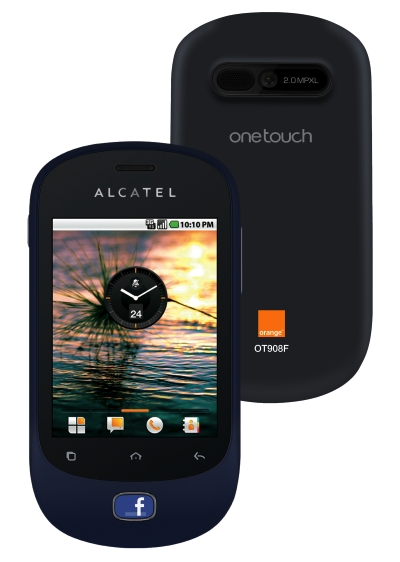Trojan horse for OTT revenue grab, or sensible partnership?
Orange will launch three “Facebook” phones, one a smartphone based on Android OS and two feature phones, into emerging and near-emerging markets in late 2011 and 2012.
All the phones have been made by ODM TCL Communications, the firm which is licensed to use the Alcatel name on its phones, in partnership with Facebook. They carry a hard Facebook button, through which users can gain immediate access to Facebook services.
The Android phone, branded the Orange Vancouver, will go on sale first in Romania (with Poland to follow) on a €10 per month tariff that will include free, unlimited use of Facebook services over the mobile network.
Other mobile data is restricted to just 60Mb a month. If users go over the 60Mb using any service other than Facebook, they will be liable for overage fees, while Facebok fees will remain free.
Orange and Facebook executives confirmed to Mobile Europe that the full range of Facebook services would be available to users — including Facebook Messenger.
In Romania, users would typically pay about €4 for a 250Mb limit. Therefore you could argue (stripping out the calls and text element) that the €10 tariff is equivalent to about 500Mb of data per month – a typical smart phone tariff limit in many markets.
That would mean that a user would be confronted with a choice between another, more highly specced smartphone, but paying for Facebook data within an overall bundle, or working out whether it is worth going for the cheaper phone but with unlimited Facebook data.
Facebook confirmed it is not paying Orange for access to the phone, or to Orange customers. Instead, its resources were committed at the development stage.
The strategy of zero-rating, or preferentially rating, certain apps or services over mobile is a cause of great discussion in the industry at the moment. At Informa’s Broadband Traffic Management event taking place in London this week, for example, many of the sessions are dedicated to the topic of how operators can offer more presonalised, or flexible, data tariffs. Offering users a simple data tariff with, say, free Twitter and Facebook use, then adding “pay now” elements for video or other use is one option. Another, reverse, decision, would be to only ask users to pay for the elements they see the value in – ie pay for Facebook and YouTube, but get other services free. Operators are unsure as to which way to go, or whether just to stick with the current, tiered models.
A potential hitch for operators is that offering “free” Facebook access could open them up to potential loss of revenue from their own messaging and even voice services, for instance. And with Facebook now hosting a lot of video, for example, there could be a greater data volume to support than expected – adding to network costs. Additionally, if Facebook takes the decision to offer a lot more services from within Facebook, users could feasibly carry out almost their entire internet activities from within Facebook. All these packets would carry a Facebook header and be waved through free by operators’ DPI and policy systems.
For now, though, given the markets it is targeting and the low spec devices it has developed, Orange is unencumbered by all of these tactical possibilities. Its strategy with the Facebook phones is to bring to market low cost phones that offer users their first, guided, step into the mobile internet world, with the sure knowledge that their Facebook use will not cost them more than their existing bundle.
The phones Orange is launching are ALCATEL ONE TOUCH 585F, ONE TOUCH 813F, and ONE TOUCH 908F (Orange Vancouver in Romania). These devices will be available in Armenia, Botswana, Cameroon, France, Ivory Coast, Mali, Morocco, Mauritius, Moldova, Niger, Poland, Reunion, Romania, Senegal, Spain, Tunisia and Uganda. Exact launch dates will be announced locally at a later date, as may further countries.


